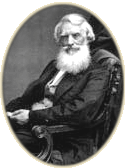

Incoming ships provided the first word of war, peace, business news, political developments and myriad other information that found its way into the minuscule type of The Journal of Commerce, the publication that Arthur Tappan and Samuel F.B. Morse launched 175 years ago. |
The world today is far different from the one that existed when Tappan and Morse decided that New York needed another newspaper. Morse’s telegraph was still a decade into the future. Railroads were in their infancy. The clipper-ship era had yet to begin. Airplanes, telephones, the Internet— none of them existed.
Newspapers competed aggressively for news, with the JoC at the head of the pack. The JoC operated two deepwater schooners to intercept incoming vessels and get stories ahead of the competition. Following Morse’s invention of the telegraph, the JoC was a founding member of the Associated Press, now the world’s largest news-gathering organization.
Publications in the 1800s weren’t shy about commenting on current issues. The JoC weighed in on the biggest issue of the day—slavery. Gerard Hallock and David Hale, partners in the JoC, were fervent abolitionists, but also decried the tactics of the war wing of the Republican Party.
After the Civil War broke out in 1861, the postmaster general suspended the paper’s mail privileges, effectively interrupting its publication, on grounds of “disloyalty.”

Business cycles in those years had much sharper peaks and valleys than they do today. The panics of 1893 and 1907 followed several other financial upheavals in the post-Civil War era. Many could be traced to the weak banking and monetary system. The JoC staunchly supported tariff reduction, free and unfettered markets and a sound banking system. |
Three years later, President Lincoln ordered the JoC closed after it was among New York papers victimized by a bogus story quoting the president as calling for 400,000 more volunteers.
After the 1907 panic, a brilliant young JoC editor, H. Parker Willis, became a leader in the drive to establish a U.S. central bank. He teamed up with Carter Glass, the Virginia senator, to write the Federal Reserve Act. Much of the work was done in the offices of the JoC.
Throughout its history, the JoC maintained a different perspective on the news. Coverage of major events, such as the San Francisco earthquake of 1906 and the U.S. entry into World War I, emphasized the effect on business. During World War II, the JoC reprinted and indexed the wartime regulations that controlled production and supplies.
In the postwar years, the JoC also earned a reputation as a prime source of international trade news. In 1973 the paper scooped the world on perhaps the most significant economic development of the last 30 years. Six days ahead of any other newspaper, the JoC reported that Arab nations were going to embargo oil shipments to the U.S.
The paper intensified its coverage of shipping, earning its nickname as the Bible of the maritime industry. Shipping was transformed forever by the introduction by Malcom McLean in 1956 of the container ship. Containerized shipping made traditional breakbulk ports obsolete and provided the means for Asia’s export boom, which changed the world’s economic map. The JoC reported in detail on these and other developments in transportation and logistics.
Throughout its 175 years, the JoC has been characterized by a willingness to operate apart from the herd, and by an ability to adapt to changing conditions. Instead of grappling with a 35-by-24 inch broadsheet newspaper as JoC readers did in 1827, they now read it in magazine form or on the Internet. But the mission is the same.
Legal disclaimer | Privacy policy | Terms & conditions
 ew York's piers were the center of attention
in 1827. They handled half of all U.S.
imports, and the new Erie Canal was generating
additional business. An average of four ships a
day arrived in port, bringing passengers, cargo and the
most perishable of all commodities-news.
ew York's piers were the center of attention
in 1827. They handled half of all U.S.
imports, and the new Erie Canal was generating
additional business. An average of four ships a
day arrived in port, bringing passengers, cargo and the
most perishable of all commodities-news.  he decades following the Civil
War brought spectacular
advances in technology.
Bessemer's furnace, McCormick's harvester,
Edison's incandescent electric light
and Bell's telephone - each of these
inventions spawned new industries. The
nation was in a railroad-building frenzy.
Steamships were replacing sailing vessels.
he decades following the Civil
War brought spectacular
advances in technology.
Bessemer's furnace, McCormick's harvester,
Edison's incandescent electric light
and Bell's telephone - each of these
inventions spawned new industries. The
nation was in a railroad-building frenzy.
Steamships were replacing sailing vessels.